
A missionary friend told me once of a person she’d spoken with who, as a child in Africa, was slapped every time she asked a question.
I was moved by the person’s insight: “You don’t just stop asking questions,” they’d mused to my friend.
Reading Time: 4 minutes
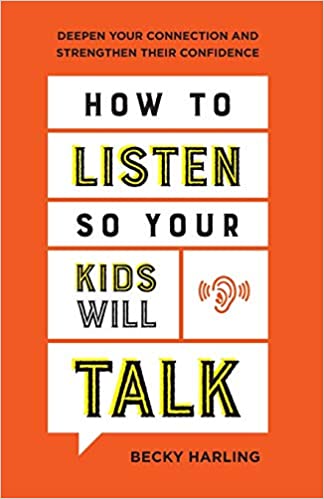
This week, I’m working through the final interior design and whatnot on my own parenting book (due out this October: Permanent Markers: Spiritual Life Skills to Write on Your Kids’ Hearts. #shamelessplug). And there are moments in real-life parenting when I’m whispering to myself, “Maybe we should retitle this thing I’ve Got Nothin’.”
But those moments give me all the more reason to get excited about other parenting books genuinely trying to step in with practical ideas to help us connect and shape and love well. So I’m tickled pink to be offering two copies of Becky Harling’s How to Listen So Your Kids Will Talk (Bethany, 2021).
I don’t offer you books that freely (…there’ve been some I haven’t offered). I want to earn your trust when it comes to resources. And most other things. (Things you should not trust me on: Math. Athletic ability. How to care for straight hair. Potty training.)
But Becky’s got some gems tucked in How to Listen So Your Kids Will Talk. Please, read over my shoulder.
Becky’s husband Steve asks her adult children this question–and Becky mentions that by God’s kindness, “I was able to receive all that they shared.”
What I love about this: Throughout the book, Becky seems to indicate that listening to our kids, to anyone, requires humility. There is a profound grace in asking good questions, seeking to really be present with the person across from us, and shelving our agendas while we receive someone.
Dietrich Bonhoeffer wrote wisely, reminding people like me of the danger of always having a helpful response:
The first service one owes to others in a community involves listening to them. Just as our love for God begins with listening to God’s Word, the beginning of love for others is learning to listen to them. God’s love for us is shown by the fact that God not only gives God’s Word, but also lends us God’s ear.
We do God’s work for our brothers and sisters when we learn to listen to them.
So often Christians, especially preachers, think that their only service is always to have to ‘offer’ something when they are together with other people.
They forget that listening can be a greater service…Christians who can no longer listen to one another will soon no longer be listening to God either.
Becky peppers How to Listen So Your Kids Will Talk with something unexpected: Wisdom and questions for self-care. Why? “Parents who are tired and overcommitted are more likely to lose it with their kids.”
Yes. Yes, we are. (I had to wrestle upon this tough realization in The True Cost of Overcommitment.)
So Becky asks great questions like,
She also asks…
I’ve written a bit about what it’s like to have a child that’s different from what you expected, or When You’re Scrabbling for Hope for *That* Child. or When Your Child’s Weaknesses Feel Overwhelming.
Every one of these has been me.
I find that my kids occasionally rotate in and out of my triage. And for better or for worse, that triage child determines not a small part of my life experience in that season.
But I’ve also been thinking about this: Those times of concern also increase my advocacy and attachment to that child. I have fierce feelings for my second son, for example, because of all we’ve slugged through with his ADHD.
These times have kneaded into me God’s advocacy and love as a Father, too.
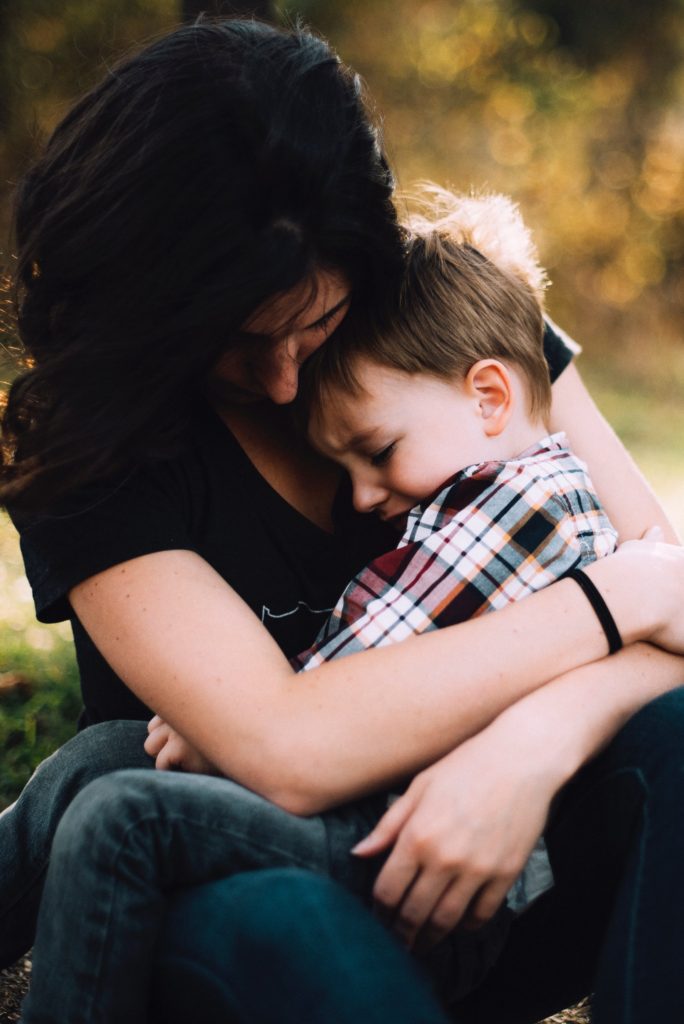
As a question-collector, I love this genius question Harling posed to kids. Listen to some of their answers:
Now I want to go ask my kids!
I was relieved that this was something my husband and I (him even more than me) are already doing. We rotate through our kids (not on a schedule, per se), taking them for coffee or whatnot. (Much easier pre-COVID, but not un-doable now.)
This is one of those answers I anticipate in response to “When are you most likely to talk to me?”
Totally have not considered applying this verse to parenting (Proverbs 12:16). In fact, Harling counsels parents who want their teens to talk to practice not looking shocked.
This has been 100% true for my teens. Sometimes I’ve totally managed this–but I’ve had to pay for the times I haven’t.
Becky elaborates, “If you want your kid to talk to you, the ‘evil eye’ has to go.”
Shot to the heart.
What if you have little-bitty kids right now? I loved this quote she requotes: “In a child’s first two years, the desire to experience joy in loving relationships is the most powerful force in life.” Referring to the location of the “joy center” behind the eyes, the quote continues, “In fact, some neurologists now say that the basic human need is to be the ‘sparkle in someone’s eyes.'”
Becky opens each chapter with other thoughtful nuggets from other authors, too–like this one I love.
We’re called to see the preciousness of our children even when they are covered in their own “mess.”
Dr. Karyn Purvis
Here the Gospel in there? Jesus coming to us in our mess?
Me, too.
With my recurring anger issues, maybe I should get this one tattooed on my person somewhere. It’s an idea.
That said–there’s a lot of parenting gold to be mined in How to Listen So Your Kids Will Talk. And I’m thrilled to give away two copies!
I’ll contact you via the email address you enter. Thanks for being a reader!
Reading Time: 5 minutes

Anyone else out there go through these seasons when you’re struggling to find hope around one of your kids?
Gnawing on this recently, I realized I’ve gone through seasons of this with each of my kids. Some more than others, sure. But there was that year when I was deeply concerned about my daughter’s manipulation. Or my son’s ADHD taking a wrecking ball to his relationships. Or that kid whose ego I could see splintering him off from listening to God.
I confess I’ve had some of those days lately, emphasized by the occasional argument or just the regular triggers of my own fear. For one particular conflict, I felt like God gave me so much grace in the moment to handle it…but I woke up in the morning wrecked.
I asked my husband, How is that doing the right thing feels so horrible?
(I know. Welcome to parenting.)
So I’m scribbling down reminders to myself today, and thought you might want to peek over my shoulder. ‘Cause maybe you’re there, too.
Recently on a walk, I asked God if he would give me just one slice of hope around this child every day. (Honestly, a tiny voice in me wondered if I was setting myself up for disappointment.)
But I’ve been delightfully surprised. God has indeed given me at least one thing to hope for every day.
And there’s even some psychology behind that. Social researcher Shaunti Feldhahn points out that looking for things to praise a person for changes our own brains. Our own hearts.
You might say it’s thinking on what’s true, noble, right, pure, lovely, excellent, praiseworthy (Philippians 4:8-9). (Keeping a running list helps, too.)
Feldhahn tells the story of a woman who accepted Feldhahn’s researched-based 30-Day Kindness Challenge, but told Shaunti, “You don’t know my husband.”
The Challenge, see, requires praising or appreciating one thing each day about the person who’s the object of your challenge. The woman thought she’d need to store up a bank of things to praise him for, because she wouldn’t have something each day.
But as she continued with the challenge, her list of things to praise…grew. Every. Day.
Finding sources of praise–toward God about my child, or verbally to my child–changes me.

This is my next step, I decided after that conflict. I’m taking the Challenge for this child (just one person the first time, Shaunti suggests). Scroll down on this page on Shaunti’s website for the three requirements to complete each day for 30 days.
I’ve increasingly realized my interpretations of events–the stories I tell myself–powerfully affect my sense of love and hope.
Take, for example, my rowdy boys yukking it up the other night after 9 PM while I was seeking to relax. We have renters living in our basement–who are told when moving in, “Please expect family noise.” As in, It might sound like a herd of rhinos are sparring above your head.
Yes, I asked the boys to chill. But I also turned to my husband and said, “Hear that? That’s the sound of our kids getting along.” Yes, like animals that might fare better on the African savannah–but hey, getting along.
I used to be confused by what Jesus meant by “the eye is the lamp of the body. So, if your eye is healthy, your whole body will be full of light” (Matthew 6:22). Huh?
But it’s the way I see things–more accurately choose to see things–that makes my perspective healthy or unhealthy. The story I tell myself about what’s going on affects a lot of how I act, and how much light I’m able to see.
(God seemed to remind me this past week that I chronically underestimate both his love and his control.)
So in keeping with my first memo–I’m looking for the hope when I’m tempted toward abject fear or anger. Is there something to be thankful for? Is God’s goodness present in some form, rather than all turned black?
Author Amy Young reminds me God welcomes my yearning. He asks me, like he asks so many others in the Bible–“What do you want me to do?”
Maybe you’re not sure.
Read over this list of desires or longings and see which catch your eye, or stir a longing in you:
Peace
Relief
Comfort
Revenge
Rest
Protection
Presence
Healing
Getting in touch with what we want, presenting it to him, helps us manage that desire, keeping open hands…rather than it managing us from behind.
I was fascinated by a question in David Powlison’s X-Ray Questions–designed to reveal idols in my heart. He asks, What do you pray for?
At first, I thought praying would be the exact opposite of something taking up God’s space in my heart, stealing my reverence and worship.
But can even holy endeavors become idols? You betcha. It is good and beautiful for me to pursue raising godly kids. But if God doesn’t give that, and I’m seething in anger or oozing unbelief from what he’s taken from me?
That longing swells beyond its good order. It can seek to control and punish. (Note: This indeed can describe me. Right now.)
So yes! I should pray for those things and present them to God. But yes, my longing can teach me a lot about the heart they come from.
Puritan preacher Jeremiah Burroughs wrote,
You cannot imagine what great deal of good it will do to resist the very next temptation.
So I’ve been doing that lately: praying for my kids to resist their next one. I also pray for specific temptations I anticipate for each child.

Truth: I began this post a month ago. Somewhere in there, I went through some dark days, realizing how long I’ve been praying for this child. How long I’ve been…
Waiting.
But even as I type, I marvel at what God’s done in the last month. No miracles have in fact bloomed before me–other than the small miracles of God resurrecting things in this child’s life. They’re like buds after a winter, when you wondered if that one tree was dead…or just dormant, gathering ingredients for growth.
If you’ve read to here? I’m praying that today, you glimpse some surprising signs of life.
Reading Time: 5 minutes

I still recall with vividness my son’s drawing, proclaiming my anger issues to the world.
It was in red marker (his favorite color). Chunky hands rested on wonderfully slim, stick-figure hips. “I made you look mad, but you’re not mad in this picture,” he explained.
“Am I mad a lot?” I asked, willing him of course to say no.
“You’re mad a lot, but not in this picture,” he clarified helpfully.
See, I didn’t really think I had an anger problem until I had kids. (Newlywed-me actually told my husband I’d never had problems like this with anyone else, so it must be his fault.
True story.)
Maybe you already know your hot buttons.
I’m personally more likely to lose it when we’re in a hurry. When I’m feeling taken for granted. And one particular week a month.
But it helped me to conduct autopsies on my outbursts–discovering what was fueling my anger and how to start cutting off the source of that fuel.
See, back when I was potty-training kids, there was a progression:
1 ) Kids recognize what their bodies just did.
2) Eventually, kids recognize when their bodies are actually doing it.
3) Finally, kids recognize before they need to go.
And that’s me with anger. A lot of times I’m still on step one–figuring out what just happened and what should have happened. When a freeze-frame of my yelling, livid face might not hold the caption, Behold! A Jesus-follower loving her children.
There’s a need for confession and repentance to God. To my kids.
Or sometimes I’m on step 2. Hey, you’re blowing your top! Better step away and make sure the Holy Spirit’s in the one control of you.
But the best happens in step 3–when I’m able to head off an angry outburst at the pass. Or when I can hit the brakes enough that I’m not driven by the emotion, but by love and laser-precise anger.
Keep in mind the powerlessness kids may feel when an authority figure and provider is angry with them. It could possibly be an escalated version of a boss raging at us.
I had to ask: Do I want my kids to have to protect themselves from me?
My anger, for all its energizing power, has been a destructive, corruptive force, incinerating my kids’ emotions.
I need to handle conflict in ways that actually build my family up rather than tearing it down.
So allow me to ask: Why does God get angry?
You probably know this.
Jesus was angry. Anger is a jetpack for change and injustice. It’s a sign something valuable and precious is trampled on.
God’s anger displays proper justice against those who legitimately do evil. It protects what is right and holy and pure; it acts on behalf of the oppressed.
When we see unspeakable atrocities from genocides or racism or against the poor, it is God as Righteous Judge that gives me any hope for the future (see Matthew 10:26).
For a more extreme example, if someone hurt your son or daughter, for example, anger would be an appropriate emotion.
Making us in his image, God allowed us to share his capacity for this emotion, too.
But too often, my own scale of “righteous judgment” is…off. (Think of a conveniently non-zeroed bathroom scale after the Chinese buffet.)
My loves swell disproportionately. A proper desire expands into a clawing, judging, punishing demand. (See Hungry: When Soul-cravings Leave Us Vulnerable.)
Usually, I need a few minutes to get out of the more instinctual part of my brain (my fight, flight, or freeze instincts)…and help my kids get out of theirs. It gives me time to pray, too.
Try these questions to help yourself emotionally step away when anger is hot.
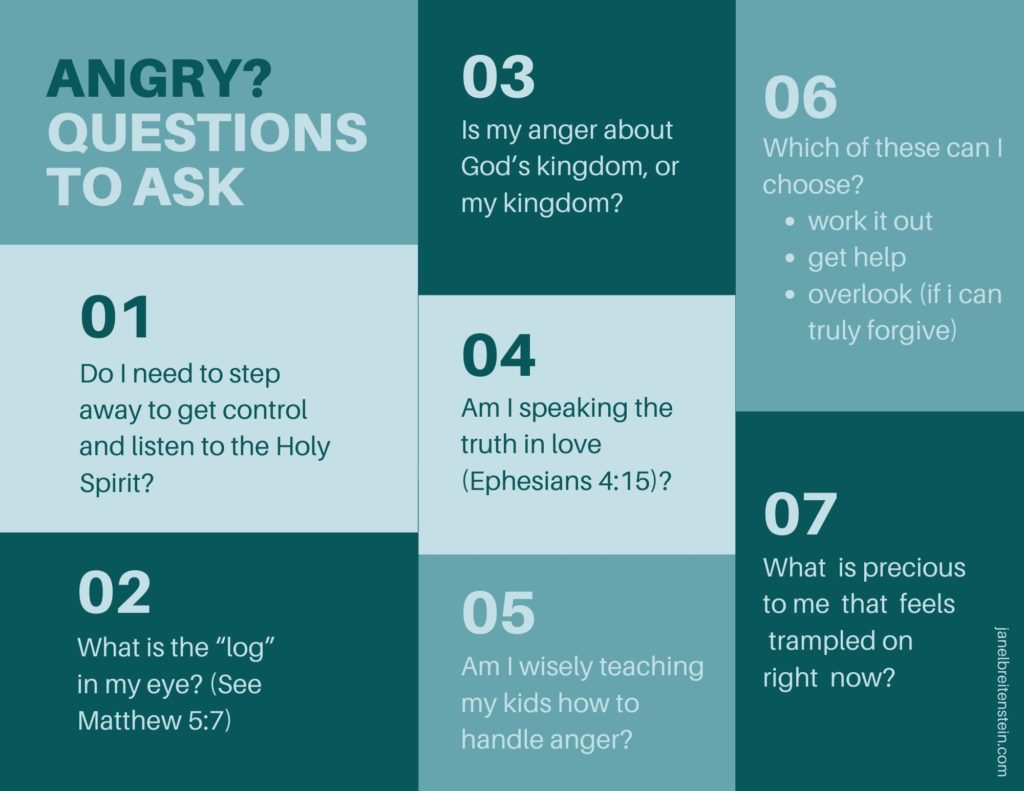
So in light of that inevitable human miscalibration, I like Tim Keller’s summary of the anger I need: not No Anger, not Blow (up) Anger, but Slow Anger. God describes himself throughout Scripture as slow to anger, abounding in love.
Keller explains we want to use anger as a scalpel–not a grenade.
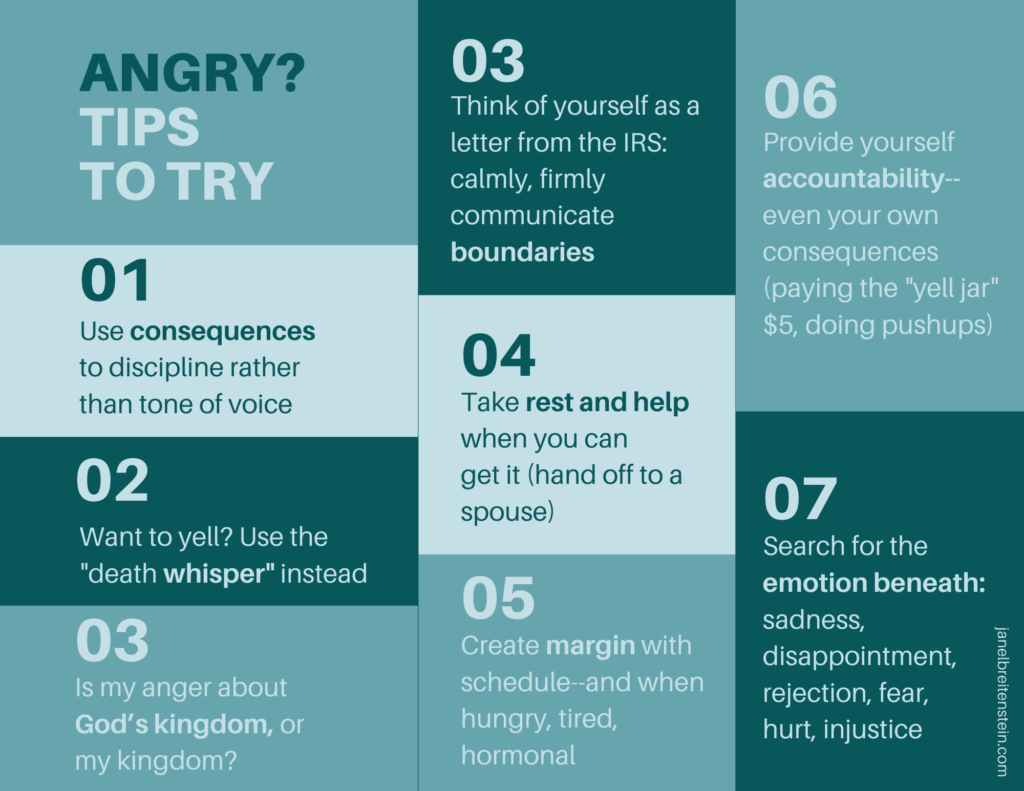
Out of the overflow of the heart, the mouth speaks (Matthew 12:34).
So I could be like, Lord, the dog puked on the carpet! And my kids are SO disrespectful! And my husband totally forgot again to pick up milk, so I have to go out with all three kids and strap them in the car seat and take them to the bathroom in the middle of my shopping.
…but that’s not the real issue, is it? Isn’t the issue inside of me?
When I see the source of my anger as outside of myself, I surrender my ability to change.
And honestly, I wish I could tell you, So that was then! Great news is, I’m so much better now!
My anger issues are unquestionably better. In some ways, I’ve sadly passed them on to my kids.
In nearly all ways, it’s a “long obedience in the same direction.” But I’m not the same mom I was when my kids were little. (And my hips are definitely a little wider than a stick figure.)
It’s the hard, beautiful work of God in my life toward holiness–of the Holy Spirit making self-control a reality.
Ready to get a grip on anger with me?
Two of the most important words you’ll ever say
When Your Teen Yells at You: 8 Win-win Ideas
When Anger’s Hot: Raising Self-Controlled Kids in Outrage Culture
Reading Time: 6 minutes
 So like it or not, we’re all homeschooling now, right?
So like it or not, we’re all homeschooling now, right?
I personally was World’s Most Reluctant Homeschooler…until surprisingly, I ended up loving it. I even learned some things about my own strengths and passions I wouldn’t have known. (My kids eventually transferred with relative smoothness to public school.)
That very well may not be you. You might just be looking for ideas so your child, the walls, and the permanent markers stay socially distanced.
But homeschooling your preschooler with some fun and creativity might be easier than you think. Grab these easy ideas!
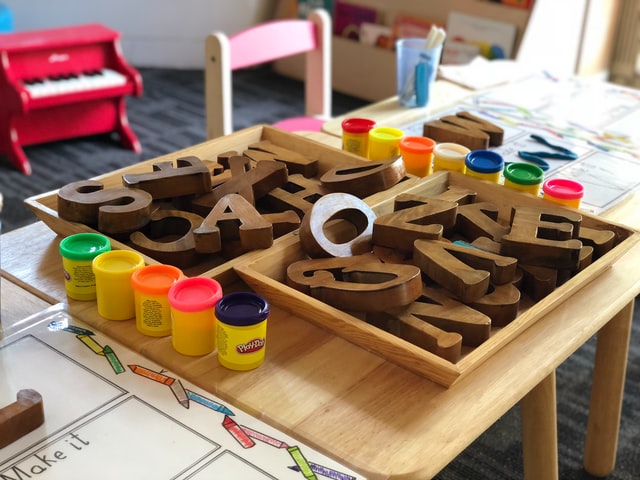
Reading Time: 5 minutes

So maybe like me, you got the automated notice from the school yesterday that your kids–surprise!–have an extra week of spring break next week, because #coronavirus.
And maybe like me, a member of your family braved Costco this week. Or maybe you now possess a weird amount of toilet paper–which according to a meme I saw yesterday, is now the bottom rung of Maslow’s hierarchy of needs.
But at least two kids I know have grappled with anxiety because of what they’re seeing in stores and on the news. They’re picking up on the weirdness.
How does one go about discussing a pandemic with children? What should we keep in mind as we help kids deal?
Yes, I have stacks of canned tuna slowly taking over my laundry room (which doubles as pantry and closet–the room, not the tuna). But kids are taking their cues from us.
So my husband and I are targeting “calm honesty” about coronavirus with the kids…as an outflow of what we’re seeking to cultivate in our own hearts.
Remember: We want kids to be able to come to us with their questions and feel like they’ll find both the truth and a safe place for their fears.
As R.C. Sproul has said,
If there is one single molecule in this universe running around loose, totally free of God’s sovereignty, then we have no guarantee that a single promise of God will ever be fulfilled.
That is to say, coronavirus is on God’s leash. Every iteration goes through his throne room.
That’s not to say “safety” looks like “no one I love will get this virus, and I will have all the toilet paper I need”. Instead, it’s saying, Lord, this is what I want. But your will be done (see Luke 22:42).
Preparedness is lauded throughout Scripture–in Proverbs (like 31:25, 6:6-11), in the Gospels (like Matthew 7:24-27 and Luke 4:28). I personally consider constant news-monitoring a non-constructive anxiety-stoker. But when I see a storm coming, I do shut the windows and have the kids pick up their bikes from the yard, y’know?
But there’s another kind of preparedness to have that I guarantee you CNN has said nothing about. Let’s be ready, in conversation with concerned friends, to give a reason for the unwavering hope we have–making the most of every opportunity (1 Peter 3:15).
Is this one more prone to anxiety? Does this one need more information, or another one more external processing time? know your kids’ weaknesses and how they deal with stress.
Treat them as individuals–maybe with a side of hot cocoa, sitting on the sofa–to deal with what concerns each of them.
One of my teens is on the “this is an overreaction” track. One of my kids was in tears from the month-long cancellation of all of his favorite extracurriculars.
But this is about protecting the most vulnerable of our population. In that way, how we respond is missional and compassionate.
Who wants to be the person who infects someone who’s immunocompromised? No one.
Let’s pray that the Church shines right now in her protection and advocacy for the weak. As people, let’s reiterate our trust in God–rather than merely the science or material goods he gives.
And friends, let’s be generous. A time of shortage may be near when we can love our neighbor as ourselves through generosity. Let’s be the Church.

Not even on snow days do you get this kind of weather with no place to go. So avoid cabin fever and choose to settle in.
Order a few used chapter books. Roll out some butcher paper for a mural. Order a tie-dye kit. Make waffles. Play this family version of the newlywed game. Put out a puzzle.
Spend a little extra time with a child tucked under your arm, just talking–because stuff like this needs extra talk-time.
During this extra school time off, grab 5 minutes a day to talk about a related Scripture:
Taped by our sinks are now reminders for them to mentally sing “Happy Birthday” twice while washing. We’ve also got reminders for them to eat mindfully (#teenagers). Get them to cough in their elbows, wash before eating, and all that good stuff.
These aren’t just guidelines or rules: Connect this to loving others well and caring for people. (Protecting someone is a great reason to lather on a little sanitizer.)
Who’s one more vulnerable person in this time who your child can pray for each day? (Gently remind them each day, or set a time–like bedtime–when you’ll pray together.)
So you can understand what it’s like to view the world at three feet tall right now, ask questions about what your kids are seeing and hearing. (Remember how Jesus would ask people questions even when he knew the answers? This is a chance to relate to those we love, to receive their stories and perspectives.)
Even now, God stacks gifts all around us: Information. Public health training. That bottle of hand sanitizer you unearthed in the pantry. Good health for your kids’ grandparents. That friend of yours who just arrived home from Europe in time. An extra off to enjoy each other–and an instantly less-busy schedule. Peace because even in a worse-case scenario, those of us who believe have Jesus and heaven.
Help kids choose trust rather than fear by thanking God sincerely for the ways you see his kindness. This isn’t Pollyanna, bright-side thinking.
This is choosing the joy God offers to us as anchor.
Friends, I am so thankful for a God who knit every cell of us together in our mother’s wombs (Psalm 139:13-14). He has weathered us through the non-events (like Y2K) and the true tragedies (like 9/11) alike.
May we shelter beneath him, and find reason to sing (Psalm 63:7).
Reading Time: 4 minutes

So yeah. That happened.
I won’t tell you which one. It doesn’t matter. And I have this phobia my kids will need to be in therapy because their mother is a writer.
I didn’t really want to tell anyone about it. Maybe you’d think I don’t have control over my kids (I do to some extent, but which of us truly does?). Or that I’m okay when a child yells or speaks disrespectfully. (I don’t.) Or wonder about their character. (Sometimes I do.)
But then again, maybe you’ve experienced when a child yells at you–even for a painful season. If not, maybe try the next blog over?
Let’s just say this child’s arrows found their mark. I’d been planning to read before bed. Maybe I cried a little instead, listened to a worship song that would speak some truth to me since my husband’s out of town.
The good news: I handled it well at last.
The bad news: It pretty much still stung.
What can you do when a teen–or any child yells at you?
Evaluate why they’re provoked. What part should you own? What’s the “log in your eye” (Matthew 5:7) you need to remove before you analyze the speck in your teen’s eye?
Beneath this disproportionate reaction, what’s being stepped on?
Through a series of conversations, I finally understood this child didn’t feel like I trusted them. That wasn’t a message I’d given (this time), but it was what they received–and that meant something.
The next morning, I understood I had an opportunity to value my child’s emotions–which went a long way to defuse the conflict. The child did not have to fight anymore for what they felt was valid.
BTW: Nearly 1 in 12 teens, Harvard says, has an anger disorder. If you’re noticing signs, get help.
I taught my kids a little ditty from Proverbs 15:1:
A soft answer turns away wrath,
but a harsh word stirs up anger.
This song probably helps me more often than it helps them. I’ve written a lot about my anger problem, and have found this verse to be absolutely true.
Tone of voice seems a pretty good barometer of my self-control. It’s also usually an immediate deescalator.
So when your teen yells? Keep calm and parent on.
Keep your voice level and let them know it’s not okay to speak this way to you. If they continue, you’ll take away their phone, or screen time, or whatever their pinch point is.
You are not powerless. Kids are nearly always disobeying the 5th commandment when they’re yelling at you.
This is not okay. And it won’t be okay for them to yell at a future spouse, a future boss, or anyone else.

The next morning, I made a warm drink for The Yeller. I tried to communicate with tone of voice that this wasn’t an effort to manipulate or grovel. I think the child got the idea this was just grace in beverage form.
Grace–undeserved kindness–has this way of prying open our eyes; of humbling us. Proverbs puts it this way:
If your enemy is hungry, give him bread to eat,
and if he is thirsty, give him water to drink,
for you will heap burning coals on his head,
and the Lord will reward you. (25:21-22)
A little gesture smoothed the way, I think?
My child apologized. That was cool.
As long as your spouse can be part of the solution (I know–that’s not all spouses), ask them to stick up for you without inflaming things. Sometimes it’s easier when someone else requires respect on your behalf.
A couple of weeks ago, I’d been reading this verse to this very child:
In all circumstances take up the shield of faith, with which you can extinguish all the flaming darts of the evil one. (Ephesians 6:16)
I needed faith here: Faith that God is doing what he says, finishing the good work he’s begun (Philippians 1:6). Working even my conflict for his honor (Romans 8:28). That he channels my child’s heart like a watercourse (Proverbs 21:1). That he orchestrates repentance (see my next point); my child’s heart is his project. I’m Robin (if that) to his Batman.
I needed faith that I am who God says I am. Not who my child says I am.
God goes beyond refuge and profound presence (Psalm 46:1). He is our military ally (the Hebrew word: ezer). This battle is His before it was ever mine.
So as I prayed, I decided to step back mentally from my fear about what to do or how to change my child.
In this instance, I got the distinct impression I could ask the Holy Spirit to work, and I would just fill in with whatever actions he asked me to take.
When both of your fight/flight/freeze impulses have passed (and sometimes after a good night’s sleep)–talk about what happened.
Now, it is certainly to a person’s glory to overlook an offense (Proverbs 19:11). And parenting just requires a lot of battles we don’t pick; thankfully, God doesn’t let me know about all my sin at once.
But his kindness does lead me to repentance (Romans 2:4). And kids may not realize they’ve received mercy if we don’t confront them.
They may just see it as getting away with it–or that it’s not wrong at all.
I can be so hurt and even afraid when my teen yells–not afraid of my teen, but afraid of who they might become, or what this said about me as a parent.
But ultimately, this conflict was an opportunity for both of us to grow more like Christ and feed a stronger relationship.
Reading Time: 4 minutes

For most of my life, I’ve been one of those people who could fall asleep anywhere. This is both a rich blessing and potentially a mortifying curse, of course.
Airplanes? Hotels? Weird bedrooms? Check.
Class? Church? Rollercoaster? Check. (Except the last one. Kidding. That would be narcolepsy.)
But my daughter–as I wrote you last summer–has wrestled with insomnia for the last year. We believe it to be somewhat performance-anxiety related.
But every night, and especially with a night away from home, sleep is a thing.
And of course there’s the super-fun insomnia effect of, Oh, shoot! I’m not sleeping! That makes me more nervous, which makes it just that much harder to actually sleep.
Below, I’ll hand you some of our favorite methods, because sleeplessness seems to be on the rise.
But wait (really). Before I do–since I’m all about these meaningful/uncomfortable conversations: What’s underneath your child’s insomnia?
Fact: Over 10 years, there’s been a 17% increase in the diagnosis of anxiety disorders in kids.
What if understanding the fears that keep our kids (literally) from resting is an opportunity?
See, we can restate to them their source of value. It’s a time to be present with them and really engage–because what we fear is so closely tied to who we are, what we worship.
As my heart was breaking for my girl, I got to tell her something like this:
Trying to be perfect all the time can make us really nervous, depressed, busy, and fake.
You don’t need to be afraid of not being perfect, or even of disappointing people.
Jesus loves you. So you can do all this great stuff–loving people, being kind, achieving. But don’t do that stuff so he’ll love you. That’s backwards.
Our kids’ fears are a chance to bathe their developing brains in God-realities stronger than their fears–and start widening those neural pathways with truths they’ll need for a lifetime.
So how does who God is, and what he’s done for us, address what scares their hearts the most? For tips on this, see Holes–and why it’s important to know yours (and your kids’).

Develop a reliable, calming bedtime routine to signal “rest” to your body. Begin at least a half an hour before bedtime.
Make a list of sleep-promoting strategies for your child to consult.
[1] https://www.psychologytoday.com/us/blog/the-athletes-way/201905/longer-exhalations-are-easy-way-hack-your-vagus-nerve
Reading Time: 3 minutes

I could tell you my son has energy. But that would be kind of like me telling you Bill Gates is kind of good at computers.
We’re on a sports rotation at my house. It is not because we love to be busy (we try not to be?), or love getting up on Saturdays for games (nope), or think he’ll be a star someday (odds are pretty slim).
Sports, a.k.a. energy maintenance, are part of our Comprehensive Behavior Plan.
When school administrators take away recess for boys as a discipline measure, I kind of raise my mental eyebrows. Fascinating strategy. Yikes.
Psychologist and researcher Michael Gurian taught me a lot about how boys learn effectively, essentially involving a lot of hands-on strategies and movement. His is the book that told me 90% of school behavior problems are from boys. (Anyone else unsurprised?)
I remember vividly the day I slumped to the floor against the wallpaper when my son was 18 months old. (In fact, I realize I’ve written about it before.) My literal thought: I have birthed the Tasmanian Devil.
I can’t remember if this was the day that, while I was in the restroom, he toddled to the barstool, tugged it over to the toaster oven, ripped open the drink mix packets on top, and sprinkled them around like sugary pixie dust.
That’ll teach me to go to the bathroom.
But I also felt the Holy Spirit tugging at me. He may have impressed on me something like this.
You have no idea why I had to make that boy like this.
He might need to teach in an inner-city school district. He might need to reach an unreached people group. He might need to stand up for the unborn.
Put brakes on this, Janel.
But don’t rip out the engine.
Sigh. (And time to grab the vacuum.)
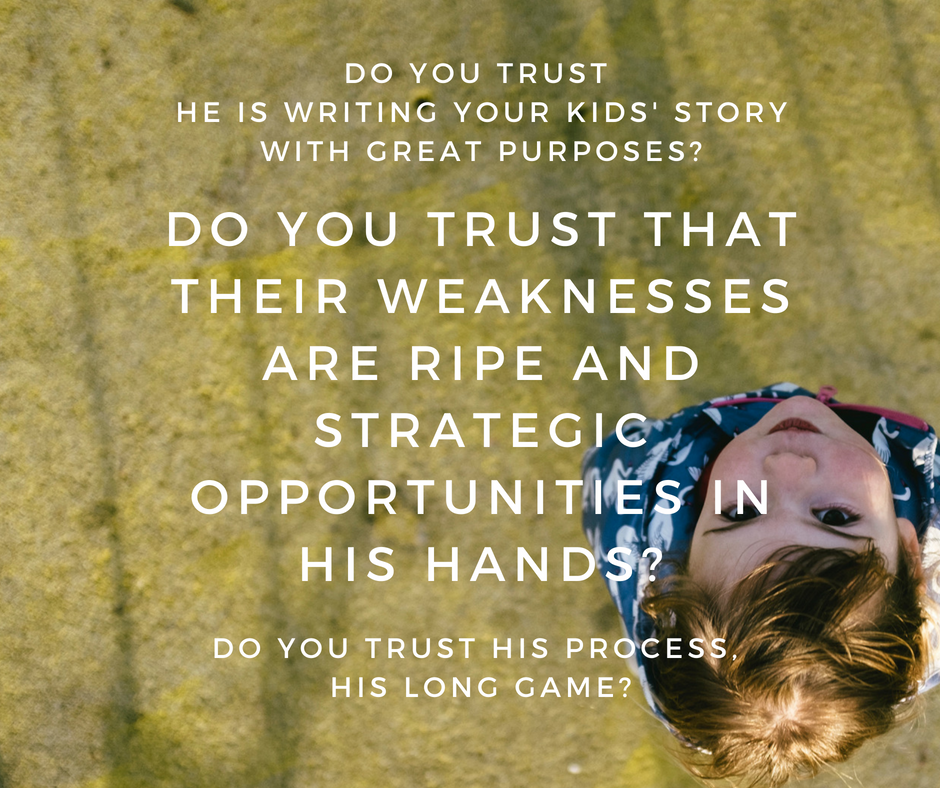
So recently, we enrolled our son in the running club at school. Monday, as I traveled, his grandma texted photos of him proudly holding a medal. Last week, he won first place in the school running fundraiser. Yesterday, he had a 7:33 mile.
I say this not to brag (I mean it! …Well. 98% of it). But to reinforce that God has plans for this kid and his energy.
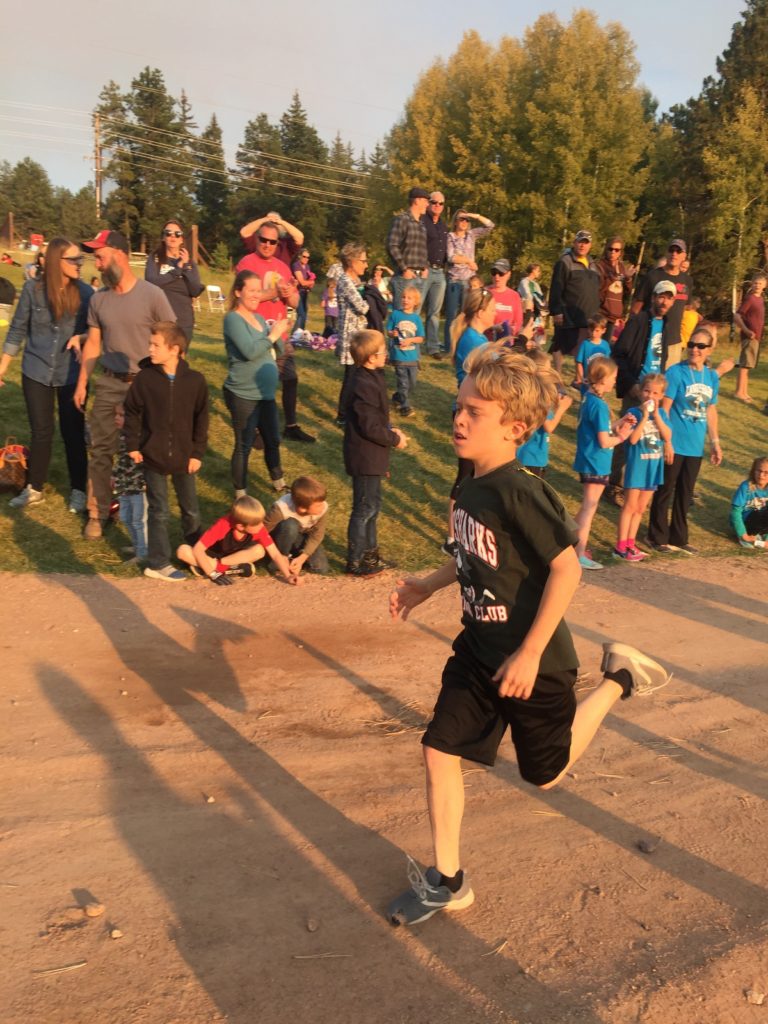
What’s the flipside of our kids’ “weakness”?
I’ve thought, as we enrolled him and shuffled him off to practice, of Eric Liddel’s mom. Y’know—Eric Liddel, the Olympian, the missionary to China, the guy we think of with the Chariots of Fire theme song. Mr. “God has made me fast, and when I run, I feel his pleasure.”
I didn’t see the movie, would have to Google his mom. But was she ever like, “ERIC! Take this OUTSIDE! NOW!” Was he ever knocking over the knickknacks? Ever seeing what was the highest stair he could jump off without breaking his head open?
(Like anyone’s kid would do that.)
I think of Mother Teresa’s mom. Mother Teresa, I’ve learned, was an Enneagram 8 (you might be interested in What’s God Think of Strong Women?). That woman was tough as nails.
But was her mom ever like, This girl. One of us is going to win, and I sure hope it’s me?
It’s the same with my teenager, as we muscle through the lumps of his spreading independence. Do I trust God’s writing his story, in all its failures and hard-won victories?
My parenting–and how I handle all those squirrely or disappointing bits–are part of my kids’ stories, too.
Here’s hoping they look back, and amidst all the cringeworthy moments, see God’s patience, God’s promise, God’s hope.
Reading Time: 7 minutes

I have a child with ADHD and one who’s got a lot of impulsive energy (i.e. occasional irrationality typical to 10-year-old boys) at school.
I know that feeling of seeing the school’s number on my phone and thinking, Please let it be good news.
Last week, in response to one of those less-than-great calls, I had to initiate one of my own that, as a generally non-confrontational person, I prefer to avoid. As in, my heart kind of knocked around just thinking about it.
I was concerned about a matter of school discipline with one of the kids. After trying to reason it away…and then talking to other involved parents…it wasn’t going away.
Sigh.
Some of you might read this post and think, Actually, I don’t care if they think I’m a you-know-what. They’ll know I’m a mom who cares for her child.
And maybe you’re right.
But sometimes, there’s a happier medium. What if conflict with that coach or babysitter or in-law leaves us, the relationship, our child, and the situation stronger.
Adding a bit more weight: We’re playing out for our kids how to handle conflict on an adult level.
What will they see? A few hopeful thoughts.
We’ve seen this just co-parenting with a spouse or stepparent. Our spouse and kids need to see we’ve got our spouse’s back–or our kids divide and conquer.
But there are moments you look at your spouse and think, You did not just do that.
Similarly, in Sunday School or daycare or school, any kid see he can divide you and his other authority figure. He’s taking his cues from you about whether he should respect authority in other environments than home.
Here’s the tension. Having had close relationships with victims of abuse? At times, advocating for your child, validating their inner (albeit occasionally errant) sense of justice can mean the world someday when they’re asking, “Who fought for me when people hurt me?”
Help kids see God as shield and defender through you—and yet still as respected authority figure.
It’s a little like hiring a lawyer: It’s great to have someone advocate for you. But both of you need to be on the side of the law (i.e. what’s right).
It’s the first step. Rather than defending our child to the death, can we teach them–even when they’re only, say, 30% responsible for the conflict–to take 100% responsibility for that 30%?

I hate that feeling of, I probably would have done something really different if I hadn’t been furious.
The consequences of our decisions—especially the impulsive ones—can have longtime ramifications on our kids. They can lend themselves to authority figures that don’t like them because of authorities’ interactions with us.
(And P.S.? Sometimes our kids lie. So there might be a fuller story to understand.)
How could your navigation of this situation affect how your child’s treated in the ongoing relationship?
Maybe you’re just ready to burn that bridge, already. But I think, too, of 2 Corinthians 5:18-20:
Through Christ [God] reconciled us to himself and gave us the ministry of reconciliation; that is, in Christ God was reconciling the world to himself, not counting their trespasses against them, and entrusting to us the message of reconciliation.
Therefore, we are ambassadors for Christ, God making his appeal through us.
Through us, are people getting the idea of God’s heart for reconciliation?
You will not be there (or should not?) when he’s addressing a quiz grade with a professor. Or dealing with his missed deadlines at work. Or arguing with his girlfriend or wife.
Before you step in or ask for that change of teacher or deliver that ultimatum, are there character lessons to be gleaned from the long game? See Should I let my kid quit? Questions to ask.
Creating us vs. them categories dehumanizes the other person. It creates an easier environment for us not to empathize. Not to respect. Not to be teachable or humble. To judge, rather than care for “that teacher.”
Check out Am I judgmental? Judgment vs. discernment.

To be more specific—you’ve got things that become overly precious to you.
(For me, it can be how I look as a parent. How my child is viewed. Being liked. Being respected. Feeling in control.)
The person you’ll be speaking with has their own idols.
If you can, don’t feed any of them.
Part of this involves first grounding ourselves in who God says we are because of Christ: Not in what we do, or what people think of us (/our kids), or the security/control/comfort we have. (See Beating Up Elvira: Self-talk, Identity, & the Enemy Stalking Your Brain.)
I like to pray Psalm 25:15 sometimes when I’m wrestling with some of the same old issues of identity. Or should be. My eyes are ever toward the Lord, for he will pluck my feet out of the net.
What could this look liks? You don’t necessarily cave when you’re being manipulated or sweet-talked. It means you can let a small insult slide. You might refuse to backpedal out of sheer cowardice. You could deny your own defensiveness.
Because your identity doesn’t come from what your child’s teacher thinks of you.
You could rest when your request gets a final, immovable no, because God loves your child and has plans for her future, even when those plans divert wildly from ours.
Just say no to gossip, social media raging, talking with people who aren’t part of the solution (aka gossip), and these other ways you might be cannibalizing your own conflict.
The Golden Rule is a great way to evaluate whether you should speak.
If a person is on the defensive, usually his or her brain is in fight or flight or freeze mode—not “please tell me what I’m doing wrong so I can change” mode. You might resort to the classic, “When you __, I feel __.”
I turn to Proverbs on this one: A gentle answer turns away wrath, but a harsh word stirs up anger (15:1).
To do this, before meeting the other party, decide what interests lie beneath the issue between you. When you’re believing the best about the other person, what do you think they want to preserve? What do you want to preserve? (When in doubt, ask them.)
Beneath, say, the teacher’s conviction your child should stay in during recess on your child’s bad days could be his need for an orderly classroom and firm, effective consequences.
Beneath your desire for your child to have a recess may be your desire for the teacher not to go crazy, and your child not to loathe school.
Is there a way you could propose that would serve both interests?
Increase the level of interaction to be as personal as you can: Even that email your best friend thought was well-written can’t substitute the trust and power of physical presence, or at least a congenial phone call demonstrating your respect of the individual.
As far as it depends on you, eliminate time crunches around an appointment, or gathering when either of you are exhausted. (Who wants to be the principal’s after-school appointment on a Friday?)
Consider asking questions like,
Of course, this doesn’t always mean “be nice”. (Though from personal experience—kindness has won far more battles for me than combativeness.)
It does mean we carry around the aroma of Christ (2 Corinthians 2:15-17), and need to consider wisely whether these are true issues of justice, or slights we can teach our kids to overlook: “It is to a man’s glory to overlook an offense” (Proverbs 19:11).
This post–What’s God Think of Strong Women? –explores (among other things) ways we sometimes misinterpret or misuse strength. But you can be strong without being a you-know-what: If possible, so far as it depends on you, live peaceably with all (Romans 12:18).
Keep advocating for your child, Mama Bear. But do it with classy respect.
I hung up from the nerve-jangling call last week with a deep breath. I’d come away with action points for our parenting at home–but feeling like the authority figure and I were more on the same team than ever. And bonus: my child wasn’t blacklisted. He showed me a slight smile when I told him I’d called.
Whew.
Conflict had become more than an obstacle–and had morphed into an opportunity.
© 2024 THE AWKWARD MOM
Theme by Anders Noren — Up ↑